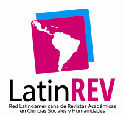The scandal as a form of political domination
DOI:
https://doi.org/10.26439/contratexto1995.n008.1959Keywords:
media, politics, public scandal, public opinionAbstract
The text is not intended to provide solutions to a well-known problem within the guild of political scientists and lawyers. This phenomenon is currently generating, in varying degrees, an extensive intellectual production and a critical reflection, which aims to shed some light on the way and the way of functioning of political systems in this era of dissolution of the old system of management international, after the fall of the wall and the decomposition of the former Eastern Bloc. The accent falls especially on the democratic political systems in the orbit of the Western world where the emergence of certain 'perverse' processes would seem to presage the fact of a deep crisis of the representative systems. Of this they give account the news and reports that appear in the press and in the rest of the means, referred to a series of public scandals.
Downloads
Downloads
Published
Issue
Section
License
All of the works published are licensed under a CC BY 4.0 Creative Commons Attribution license. (updated on March 1st 2021)
The content of the journal may be shared in any material or format. The content may be adapted, contributed upon and transformed. Both possibilities are only permitted in so far as they complete the following conditions:
- Attribution: Credit must be given where it is due, a link to the license must be provided and changes, if made, must be indicated. This should be done in the manner deemed appropriate, without suggesting that the licensor promotes you or your use of the material.
Ownership rights
The patrimonial rights for Contratexto are published under a Creative Commons BY 4.0 license, allowing authors to keep the patrimonial rights to their work without restrictions.
If a work published in Contratexto were to be copied, distributed, spread, or any other activities contemplated in the aforementioned license, the author(s) and the journal must be mentioned visibly and expressly.
Self-archive
This journal allows and encourages authors to post items submitted to the journal on personal websites or institutional repositories both prior to and after publication, while providing bibliographic details that credit, if applicable, its publication in this journal.





















